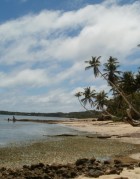[International Union for Conservation of Nature] ICUN Warns Pacific to Plan Green Energy Carefully
Nadi, Fiji
Wednesday, May 8, 2013
News Release
Pacific energy and climate change experts are discussing key energy issues facing Pacific Islands such as access to modern and affordable energy services particularly for remote and rural island communities. This meeting is set to finalize several aspects of SIDS DOCK, Small Islands Developing States Sustainable Energy Intiative, including the design of its Support Programme Platform and the implementation of 14 planned projects with an estimated investment of US$40 million.
What has been proposed at this meeting is a new pathway for energy sector development in the Pacific and that is a renewable energy pathway.
“While renewable energy is deemed by many as ‘clean energy’ we must remember that they depend on nature and its ecosystems and the exploitation of these resources must be done responsibly and with respect for the services they provide to support human livelihoods,” said Anare Matakiviti, Energy Programme Coordinator at IUCN’s Oceania Regional Office at the meeting on Tuesday.
Renewable energy interventions also have negative impacts on the environment like the carbon based fuels that are driving our economies. While the carbon based fuels are emitting Greenhouse Gases into the atmosphere, increase use of renewable energy resources impact on natural resources. And in a region that is culturally, socially and economically dependent on nature, careful planning and management is crucial.
“The ecological footprint of the energy sector with respect to exploration, extraction and infrastructure development is significant and can all lead to substantial habitat degradation,” added Matakiviti.
Renewable energy sources such as wind, solar and geothermal can impact nature in various ways. For instance, wind turbines can cause migratory disruptions for migrations of bird species, use of toxic chemicals in the manufacture of photovoltaic cells presents a problem both during use and disposal and wastewater from geothermal plants may cause significant pollution of surface and ground water supplies.
“We are not discouraging the use of renewable energy interventions, we simply encourage that countries tread with care by planning and managing well and make informed decisions,” emphasized Matakiviti.
IUCN is implementing several renewable energy and energy efficiency projects in the Pacific that demonstrate the use of energy systems that are economically efficient, ecologically sustainable and socially equitable.
The SIDS DOCK Pacific Regional Meeting is the second in a series of three SIDS DOCK Regional Meetings. It is called SIDS DOCK because it is designed as a “DOCKing station,” to connect the energy sector in SIDS with the global market for finance, sustainable energy technologies and with the European Union (EU) and the United States (US) carbon markets, and able to trade the avoided carbon emissions in those markets. Estimates place the potential value of the US and EU markets between US$100-US$400 billion annually.
SIDS DOCK was established to accelerate the transformation of energy sectors of small islands, increase energy security, reduce greenhouse gas emissions and generate resources for investment in climate change adaptation.

Pingback: IUCN – BIOPAMA bolsters progress on capacity development for protected areas in the Pacific and West Africa | oceanNRG